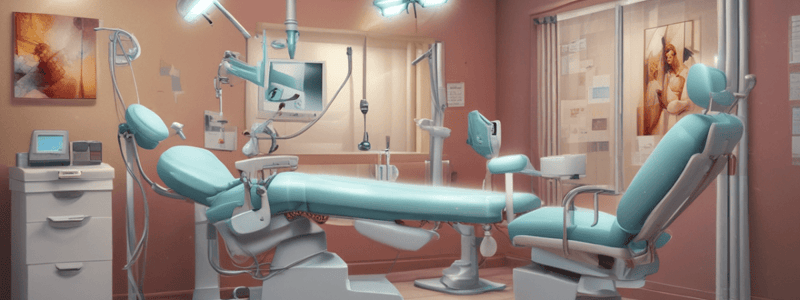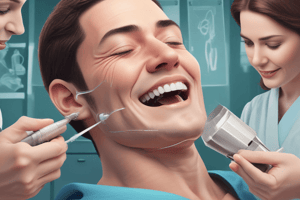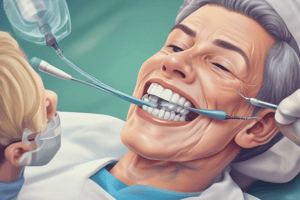Podcast
Questions and Answers
What is the primary purpose of administering local anaesthesia to all tissues in the operating site?
What is the primary purpose of administering local anaesthesia to all tissues in the operating site?
- To eliminate pain and reduce salivation during tooth preparation and restoration (correct)
- To prolong the duration of soft-tissue anaesthesia
- To increase the amount of anaesthetic absorbed by the bloodstream
- To reduce the risk of overdose of the anaesthetic drug
What is the term for the smallest amount of a drug that is effective when properly administered and does not cause adverse reactions?
What is the term for the smallest amount of a drug that is effective when properly administered and does not cause adverse reactions?
- Therapeutic dose (correct)
- Lethal dose
- Toxic dose
- Overdose
What is the maximum recommended dose of 2% lidocaine with epinephrine 1:100,000?
What is the maximum recommended dose of 2% lidocaine with epinephrine 1:100,000?
- 5.4 mg/kg
- 3.4 mg/kg
- 6.4 mg/kg
- 4.4 mg/kg (correct)
What is the duration of pulpal anaesthesia?
What is the duration of pulpal anaesthesia?
What is the purpose of a vasoconstrictor in a local anaesthetic cartridge?
What is the purpose of a vasoconstrictor in a local anaesthetic cartridge?
What is the duration of soft-tissue anaesthesia?
What is the duration of soft-tissue anaesthesia?
What is the primary basis for selecting local anesthetics?
What is the primary basis for selecting local anesthetics?
What is the systolic pressure limit for patients considered good candidates for all dental procedures?
What is the systolic pressure limit for patients considered good candidates for all dental procedures?
What is the recommended action for patients with a pulse rate greater than 110 beats per minute?
What is the recommended action for patients with a pulse rate greater than 110 beats per minute?
What is the effect of anesthetic overdose on the central nervous system?
What is the effect of anesthetic overdose on the central nervous system?
What is a possible consequence of overdosing a vasoconstrictor?
What is a possible consequence of overdosing a vasoconstrictor?
At what level of overdose do anesthetics manifest depression in excitation?
At what level of overdose do anesthetics manifest depression in excitation?
Flashcards are hidden until you start studying
Study Notes
Pain Control
- A philosopher, according to William Shakespeare, cannot endure a toothache patiently.
Local Anaesthesia
- Administration of local anaesthesia to all tissues in the operating site is recommended in certain patients to eliminate pain and reduce salivation associated with tooth preparation and restoration.
Clinical Notes
- A therapeutic dose of a drug is the smallest amount that is effective when properly administered and does not cause adverse reactions.
- An overdose of a drug is an excessive amount that results in an overly elevated local accumulation or blood level of the drug, causing adverse reactions.
Local Anaesthetics
- Each 1.8 ml cartridge contains anesthetic, with or without a vasoconstrictor (e.g. lidocaine 2% [anesthetic] with epinephrine 1:100,000 [vasoconstrictor], lidocaine 2% plain [no vasoconstrictor]).
- The number of permissible cartridges increases as body weight increases.
- The maximum recommended dose of 2% lidocaine with epinephrine 1:100,000 is 4.4 mg/kg.
Duration of Action
- Pulpal (deep) anaesthesia varies from 30 to 90 or more minutes.
- Soft-tissue anaesthesia varies from 1 to 9 h, depending on the specific agent and whether or not a vasoconstrictor is included.
Clinical Considerations
Patient Factors
Cardiovascular System
- Patients with stage 1 hypertension (systolic pressure less than 140 mmHg, diastolic pressure less than 90 mmHg) are good candidates for all dental procedures.
- Patients with blood pressure consistently greater than stage 1 hypertension (stage 2 hypertension) should be referred to their physicians, particularly if the elevation is greater than 20 mmHg.
- Pulse rates less than 60 beats per minute (beats/min) or greater than 110 beats/min require further questioning.
Central Nervous and Respiratory Systems
- The central nervous system (CNS) is more easily affected by overdose of injected anesthetic drugs than the cardiovascular system.
- Anesthetics depress the CNS, but when administered properly for local anaesthesia, little or no clinical evidence of depression is encountered.
- Overdose symptoms include excitation (e.g. talkativeness, apprehension, sweating, elevated blood pressure and heart rate, elevated respiratory rate) or drowsiness.
Studying That Suits You
Use AI to generate personalized quizzes and flashcards to suit your learning preferences.



